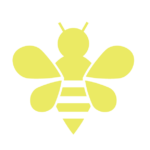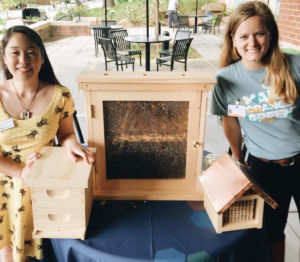UT Knoxville is recognized as an official Bee Campus as of 2020.
The Importance of Bees
The Buzz About Bees

More than 150 food crops in the United States depend on pollinators, including blueberries, apples, squash, strawberries and almonds.
Bee stories in the news:
There are many reasons why is it important to become a Bee Campus affiliate. Here are just a few benefits to our campus and community:
- Help to ensure the survival of vital animal species crucial to our planet’s complex food web.
- Raise community awareness of how our food grows and improve local food production through expanded pollination.
- Improve local plant nursery markets by increasing demand for native, pollinator friendly plants.
- Mobilize the community to remove non-native invasive plants to make way for locally native plants.
- Raise community awareness of the least toxic ways to deal with home and garden pest problems.
- Raise community awareness of the local environment’s seasonality as understanding grows about pollinators’ reliance on blooming plants and trees.
- Support growth of niche businesses such as pollinator friendly landscaping, beekeeping suppliers, chemical-free lawn care, and native seed suppliers.
Our Plan
To be recognized as a Bee Campus, UT Knoxville has to meet eight standards to showcase our dedication to the campus environment.
Establishing and maintaining a relationship that is comprised of a mix of faculty, staff, and students is a vital part of Bee Campus. Our committee is chaired by Jennifer Tsuruda, an Assistant Professor of Entomology and Plant Pathology who focuses on bee health. Members include Arborist Sam Adams, Landscape Director Jason Cottrell, and other staff, administrators, faculty, and students. These key players were charged with overseeing our pollinator conservation and education efforts, and were an integral part in making Bee Campus Certification possible.
The Campus Pollinator Habitat Plan must include locally native (indigenous to our ecoregion), pollinator-friendly plants with regional sources, and the least toxic integrated pest management (IPM) plan.
The plant list and IPM plan is still in draft status, but will soon be posted here to offer a valuable landscape-management model applicable to other local landscapes.
Our first official Bee Campus habitat plan is located outside Fred Brown Hall. Check back here for our plans for future habitats on campus.
 Every year, we will host events that show the importance of pollinators and acknowledge our certification as a Bee Campus institution. Events may include workshops on pollinators, planting pollinator gardens, presentations about pollinators, garden tours and guided pollinator walks, and films about pollinators.
Every year, we will host events that show the importance of pollinators and acknowledge our certification as a Bee Campus institution. Events may include workshops on pollinators, planting pollinator gardens, presentations about pollinators, garden tours and guided pollinator walks, and films about pollinators.
This year, we are hosting a “Garden Buzz” event in partnership with TVA and UT Gardens. The event will take place June 20th, 2023 as part of National Pollinator Week!
Service-learning is an integral part of both Bee Campus and UT. Through Bee Campus, we will sponsor and track student service-learning and service projects to enhance pollinator habitats on-and off-campus.
UT already offers many sustainability-focused and sustainability-related courses. Several of these directly deal with pollinators and their importance to the environment.
As a Bee Campus requirement, we must offer a pollinator protection course and/or workshop and/or incorporate pollinator protection topics into the curriculum. Workshops provide continuing education credits for professional pesticide applicators and/or landscape designers, etc.
Posting signage regarding pollinators to educate the campus and broader community about pollinator-friendly landscaping principles is a vital aspect of Bee Campus. Currently, signs are located at UT Gardens and are in the process of being placed at our Bee Campus habitat outside Fred Brown Hall.
This is the main webpage for Bee Campus! This page will have all information regarding the above seven steps, information on pollinators, and more.
After completing our first full year as a Bee Campus affiliate, we will reapply for renewal of the institution’s certification each January by submitting a brief narrative report of the previous year’s achievements and by completing the update and metrics form.
Campus Gardens

The Grow Lab is a new campus garden that is a living laboratory to promote experiential and service-learning. Grow Lab demonstrates ecological food production methods and encourages community engagement
The Grow Lab is so happy to be part of UT’s Bee Campus proposal. Urban gardens are a great way to feed people, build community, and help support urban pollinator populations!
Visit the Office of Sustainability’s Facebook page for a list of events that involve pollinators.
 Recognized in 2013 as the official botanical gardens of the state of Tennessee, the University of Tennessee Gardens (UT Gardens) located in Knoxville, Jackson and Crossville are part of the UT Institute of Agriculture. The gardens are open during all seasons and are free to the public. UT Gardens Knoxville is the flagship campus of the statewide system and includes a variety of plant collections and garden spaces.
Recognized in 2013 as the official botanical gardens of the state of Tennessee, the University of Tennessee Gardens (UT Gardens) located in Knoxville, Jackson and Crossville are part of the UT Institute of Agriculture. The gardens are open during all seasons and are free to the public. UT Gardens Knoxville is the flagship campus of the statewide system and includes a variety of plant collections and garden spaces.